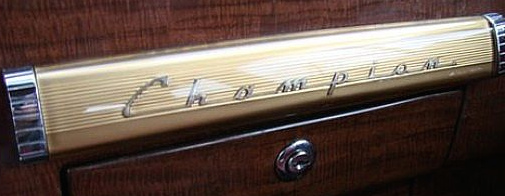
Does your organisation's writing rise above the rest? Image by Andreas Weiland. Unsplash licence.
Have you got what it takes to be a Plain English Champion? This year we have two Champion categories: the Best Organisation and the Best Individual or Team.
Here are five clues to help you decide if it’s your organisation’s time to shine. We’re sure you can think of many more!
1. Your organisation champions and celebrates clear communication
Clear communication is something your organisation values and rewards. Your leadership team walks the talk, promoting the benefits of clear communication throughout the organisation.
Internal documents, such as brand guidelines, policies, and newsletters, are written in plain English. Role descriptions emphasise the need to write clearly. Perhaps you even have formal KPIs for using plain English.
Let your industry peers know you’re a leader by entering the Champion category.
2. You’ve noticed better business results from clearer communication
You’ve got case studies or numbers that show improvement. Achieving a measurable return on your investment in business writing is evidence of Champion performance. You recognise writing is more than an everyday activity in business — it can be a way to improve business success.
If you’ve cracked it, you deserve a medal!
3. You’ve had great feedback from customers about your communication style
Getting praise from customers for using plain English is praise indeed! People don’t offer praise lightly. They’re more likely to complain about poor communication — or to say nothing at all.
Great feedback for your communication style shows you’re getting your message across in a way your customers appreciate.
We’d like to hear what brought about that success.
4. You train your staff in better business writing
Organisations that commit to a plain English culture offer their people resources and training. Writing in plain English takes skill and effort.
You train your staff to write clearly, which gives them a step up. They enjoy their writing more, and they write more efficiently.
Good on you for giving your people the tools they need to write well. That’s worth celebrating too!
5. Your organisation encourages peer review of print and online content
Peer review at key stages of a writing project is expected. People in your organisation seek out peer review as they can see the value in another person’s critique. Peer review uses a checklist or standard and is part of a defined process to achieve quality.
Good systems and processes are key to a Champion mindset. Enter the Awards and get some external recognition for your work.
Read about the entry requirements
Read about last year’s Champion organisation
Anne-Marie Chisnall August 23rd, 2018
Posted In: 2018 Plain English Awards
Tags: 2018 Plain English Awards, Best Organisation, Champion, mindset, recognition

Trophies are just the tip of the iceberg when it comes to the benefits of entering industry awards. Photo by Photo by Jennifer Latuperisa-Andresen on Unsplash
What’s the first image that comes to mind when you think about industry awards? For many people the answer might be trophies and photos in the newspaper, but those overt benefits are often just the tip of the proverbial iceberg.
The benefits of entering an industry award, and perhaps winning, go much deeper than you might first think. Public recognition is one of the most rewarding benefits, of course. But that benefit is often one of many.
Setting standards and demonstrating value
We’ve been running the Plain English Awards for 13 years. Over this time we’ve seen a steady increase in the quality of the entries. We’ve also seen a steady increase in interest in the Awards. And we’ve witnessed and recorded the benefits that organisations and individuals, as well as sponsors, reap from association with the Awards.
What are these benefits?
- Optimal benchmarking: the recipient of an award is seen as setting a standard
- Building credibility and strength: awards validate an organisation’s position with prospective customers and clients
- Demonstrating value: winning an award provides clear evidence of the value an organisation brings to its clients
- Communicating that you’re professional: winning an award shows that you’re a reputable professional whose achievements stand out
A long-term commitment to quality
What about those individuals and organisations that win more than once? This kind of achievement reinforces all the points above, and shows that you’ve committed to quality for the long term. What more could a client or customer wish for?
Read about how one organisation won our Best Organisation award in 2007 — and won again 8 years later in 2015.
Melissa Mebus August 10th, 2018
Posted In: 2018 Plain English Awards, Industry awards, Winners
Tags: 2018 Plain English Awards, clear communication, Industry awards

You, the public, call the shots in the People's Choice awards. Photo by Stuart Guest-Smith on Unsplash.
Members of the public can praise a paragon of clarity or put forward a perplexing paper in the People’s Choice category of the Plain English Awards.
You can enter documents and websites for two awards:
- Best Plain English Communication — for the most outstanding example of a plain English document or webpage nominated by a member of the public
- Worst ‘Brainstrain’ Communication — for a publicly available or widely used document or website that causes problems for many people.
How a Brainstrain award can help
The Brainstrain typically gets a lot of publicity. But even the winners of this category can turn the event into something positive. By shining a spotlight on entries in this category, awards organisers hope the entries will be rewritten in beautifully plain English.
Winners are welcome to blow their own trumpet
The winners of the Best Plain English Communication can share news of their win. They receive a logo to display on the winning publication and their email footer. They’ll also often have people blowing their trumpet for them — take a look at what stuff.co.nz had to say about last year’s winner, the Wellington City Council.
Entries come from everywhere
People nominate documents from likely and unlikely places.
The Wellington City Council’s newsletter Our Wellington Tō Tātou Pōneke won the ‘best’ award in 2017. Judges said vibrant design and friendly language made the document appealing. ‘Successfully combines drier council initiatives with more exciting information on events.’
In 2016, a paper from researchers NZIER with the forbidding title ISDS and Sovereignty won. It succinctly explained a key point of contention in the Trans-Pacific Partnership. It was ‘a breath of fresh air to readers used to struggling through lengthy, jargon-filled advisory documents,’ said the judges.
KiwiSaver documents have won both the ‘Best’ and ‘Brainstrain’ awards.
How you can enter
You have until 3 September to enter a website or document. You need to submit an electronic copy of the entry — so if you’re entering a printed document, you’ll need to scan it.
Entries must:
- be whole documents or webpages, not extracts
- be in current use for business purposes
- be owned by an organisation that operates in New Zealand
- not be owned by the organisation you work for
- not be a book, or an extract from a book.
Your identity will not be revealed to the organisations you nominate, or to the judges.
Enter the People’s Choice — Best Plain English Communication
Enter the People’s Choice — Worst ‘Brainstrain’ Communication
Melissa Mebus June 29th, 2018
Posted In: 2018 Plain English Awards, People's Choice awards
Tags: 2018 Plain English Awards, Brainstrain, clear communication, People's Choice

Last year's Plain English Champion — Best Organisation winners Hannah Morgan-Stone, left, William Meldrum, second from right, and Jerome Chapman, from Utilities Disputes, with Write CEO Lynda Harris. Photo by A Beautiful Photo.
We’re grateful this year to once again have the support of TechCommNZ, who’s sponsoring our Best Plain English Technical Communicator category. As part of their sponsorship, TechCommNZ recently published an article we wrote for them about our Trophy Tips Seminar. With their blessing, here’s that same article for your reading pleasure.
Winning an award is the best way to have your work recognised — or your team’s. And for business or technical writers, or people working in communications, the annual Plain English Awards are as good as it gets.
Tips for success from those in the know
In the build-up to the opening of this year’s Plain English Awards, we held a Trophy Tips Seminar in Wellington last month. We also broadcast this seminar through Facebook Live.
Before the seminar, we surveyed former winners and judges of the Awards to gather some tips for aspiring winners. While responses varied slightly, their main messages were clear and simple.
Best advice for aspiring winners
In short, the people we surveyed said that winning entries demonstrated similar traits.
- Short sentences
- Crystal-clear headings
- Readers’ needs prioritised
Common mistakes to avoid
To ensure your entry gets through the first phase of judging, survey respondents recommended that entrants avoid some common pitfalls.
- Unclear headings
- Long-windedness
- Excessive wordiness
- Poorly organised content
For more tips on how to submit a winning entry in the 2018 Plain English Awards, view our Trophy Tips Seminar.
Get in touch if you have any questions
You’re welcome to ask questions at any time: [email protected]. We’re here to help! See more about the Awards on our website.
Melissa Mebus June 21st, 2018
Posted In: 2018 Plain English Awards, Plain English Awards, Trophy Tips Seminar
Tags: 2018 Plain English Awards, clear communication, Finalists

Are you ready to be in the running for success?
What’s the best feedback you could hope for about a website that you or your organisation has created? What’s the greatest outcome you could imagine from a document your organisation has published? And what’s the most satisfying result you could wish for for the writers in your organisation?
How about, ‘This site was our clear and unanimous winner! We hope plain-writing professionals and trainers will use it as a good example of plain writing principles’? Or what about, ‘What’s not to like?’ And even, ‘It’s hard to see how the writers could have helped the readers more’?
The responses we’ve listed above are all true-blue pieces of feedback from judges at last year’s Plain English Awards. What kind of feedback do you think you’d get?

Going the extra mile for readers
Every year the Plain English Awards honours those individuals and organisations who have gone the extra mile to get the best outcomes for their readers. The Awards are a public pat on the back for plain English champions. They help to raise the bar for clear communication.
To decide on our champions, independent panels of plain English experts and advocates judge entries and decide on who’s best in each category. This year the Awards has 13 different categories to enter (or to be entered in).
Are you ready to be in the running?
Entries for the 2018 Plain English Awards are open. You have 3 months to get your entries in before they close on Friday, 31 August.
Enter the 2018 Plain English Awards through our website.
Melissa Mebus May 29th, 2018
Posted In: 2018 Plain English Awards, Plain English Awards
Tags: 2018 Plain English Awards, clear communication, People's Choice, Social good

A beautiful handmade trophy is one of several prizes in store for Accuro Health Insurance. Image by A Beautiful Photo
Our rights and obligations are enshrined in the law. But we can’t claim those rights or fulfil those obligations if we don’t understand them. Understanding truly is power. It unlocks our democratic rights.
That fact is recognised in the Plain English Awards category, Best Plain English Legal Document.
Last year’s winner sets the standard for legal drafting
The document that won last year was a mammoth effort. A team from the Parliamentary Counsel Office (PCO) combined twelve Acts into one: the Contract and Commercial Law Act 2017.
The judges said, ‘Parliamentary Counsel Office did a great job of combining multiple acts that were a confusing hodgepodge of legislation into a single intelligible act.
‘A clear understanding of the audience and consultation with these groups made the project stronger. The explanations in the legislation were particularly useful.
‘The revised Act is a great step forward in New Zealand for plain English legislation. And the intended audience has a much clearer picture of contractual law in New Zealand.’
You can enter any kind of legal document
Are you thinking of entering this Awards category? The 2017 winner is a hard act to follow, but don’t feel you have to try, says Awards organiser Melissa Mebus.
‘Any kind of legal document is worth entering — whether it’s long and complex or short and simple. The important thing is that it’s about a legally enforceable law, process, obligation, or right. Examples are contracts, T&Cs, notices, and legal opinions.’
Plain English legal writing brings business benefits
The tide is turning in favour of plain English in legal writing in New Zealand and overseas. Plain language practices report happier clients and increased business. And plain English can bring unforeseen benefits, with more clients meeting deadlines just one example.
One document, two entries
The PCO team also entered the rewritten Act in the Best Plain English Turnaround category, where it was shortlisted. Melissa says, ‘We welcome multiple entries for the same document. A good document or website can tick many plain English boxes, and should get the recognition it deserves.’
To enter, you have to submit the original document or webpage as well as the rewrite. The rewrite must be in current use.
Improve your chances of winning an award
Find out how to give winning your best shot at the Awards Trophy Tips Seminar on Friday, 4 May. You’ll get expert advice from past winners, judges, and supporters of the Awards. Attendance is free — book for the Trophy Tips Seminar online.
Entries now open on Monday, 7 May
We said we’d open on 1 May but we need a little bit of extra time as we upgrade to a new entry platform. Watch for entries opening next Monday, 7 May. Entries close on Friday, 31 August.
Melissa Mebus April 30th, 2018
Posted In: 2018 Plain English Awards, Finalists, Legal writing, Plain English Awards, Trophy Tips Seminar
Tags: 2018 Plain English Awards, Best Legal Document, Legal writing, Trophy Tips Seminar

Learn tips from the experts on how to win. Photo by Ray Hennessy on Unsplash
On Friday, 4 May we’ll be celebrating entries opening for this year’s Awards with a free lunchtime seminar at Write Limited in Wellington.
Hear how to be a winner from the experts
We’ve gathered together a panel of experts to give you tips on how to submit a winning entry. You’ll get expert advice from past winners, judges, and supporters of the Awards, upping your chances of a successful entry.
During the seminar our panel will explain:
- what judges look for in a winning entry
- what’s involved in submitting an entry
- what winning an Award means for an individual or organisation
- why every entry plays an important part in helping everyday New Zealanders.
Book your tickets now
You’ll have plenty of time to ask questions. Bring your own lunch — we’ll supply coffee, tea, juice, and fruit.
Places are limited so book your tickets now. Entry by koha.
Melissa Mebus April 11th, 2018
Posted In: 2018 Plain English Awards, Plain English Awards, Social good, Trophy Tips Seminar
Tags: 2018 Plain English Awards, Plain English Awards, Trophy Tips Seminar, Turnaround Award

Everyone wins with a sound sponsorship agreement. Photo by Shirly Niv Marton / Unsplash
Sponsorship isn’t about giving away money to a good cause: that’s donating. Sponsorship offers two parties the opportunity to be part of a win–win agreement.
In return for their support, sponsors get the same feel-good factor they would get from donating. But on top of that, they also get a return on the investment in their chosen cause. So, true sponsorship offers an organisation something sustainable and tangible in return for its commitment.
Sponsors get clear returns on their investment
Sponsoring the Plain English Awards offers clear returns on your investment, such as:
- alignment with plain English values. You’re seen as customer-focused, transparent, and trustworthy
- brand exposure. Forget about advertising! You’ll be widely promoted in our Awards publicity, reaching large groups of potential new customers
- networking opportunities. Plain English Awards entries come from a huge range of public and private organisations. The networking opportunities you get from Awards forums (in person and online) offer a hugely valuable return, as does the actual presentation ceremony.
Is your organisation a sponsorship ‘best match’?
Looking at the values and aims of the Plain English Awards, and from our past experience, we know the types of organisations that benefit most from sponsorship.
If you can answer ‘Yes’ to any of these questions, sponsoring the Plain English Awards could be just the thing for you:
- Do you want to reinforce to your clients or customers that you always work with their best interests in mind?
- Do you want to reinforce to your clients or customers that you are transparent in your dealings with them and with other organisations?
- Do you want to be part of a movement to improve government and business documents so that all New Zealanders can understand them?
- Do you want to help build a public preference for plain English?
- Do you love celebrating success?
Answered ‘Yes’ to one of more of these questions? It’s time for a conversation!
We’d love to hear from you
Get in touch if you’d like to talk through sponsorship opportunities at this year’s Awards. We’d love to discuss a sponsorship arrangement that would benefit both the Awards and your organisation.
Phone: +64 4 384 6447
Email: [email protected]
Visit our website for more information about the 2018 Plain English Awards
Melissa Mebus March 13th, 2018
Posted In: 2018 Plain English Awards, Plain English Awards, Social good, Sponsors
Tags: 2018 Plain English Awards, Plain English Awards, Social good, Sponsorship

Information for new migrants needs to be as clear and user-friendly as possible. Image by Dmitri Ratushny. Unsplash licence.
You’ll all be familiar with the idea of the world becoming smaller as fast-paced communications connect even the remotest places on earth to the wider world. With the click of a button we can instantly be in touch with someone as far afield as Siberia in the far north and Antarctica in the far south. But does the amount of communicating we’re doing necessarily mean that we’re understanding each other?
What if I just speak a little louder?
I don’t have to dig too deep into my own experiences of travel outside New Zealand to know how difficult a language difference can make life. I even remember once falling into the dire trap of increasing my volume to try to get my message across. How was that ever going to work? Luckily for me (but not the poor person I was talking to), our topic of attempted conversation wasn’t too important.
So what must life be like for the many migrants who make their way to New Zealand each year and don’t speak English fluently? To put things in perspective, a quarter of New Zealand’s population was born overseas. And for many of these people, English is their second — or even third — language. Imagine what these statistics mean for an organisation like Immigration New Zealand (INZ), which needs to communicate ideas, many of them complex, through a variety of mediums every day.
What plain English means for migrants to New Zealand
At the end of November last year, supporters of the annual Plain English Awards celebrated its 2017 winners at a ceremony in Wellington. INZ was one of the Awards’ valuable sponsors, and representative Anne-Marie Masgoret gave a brief address during the ceremony. While no one in the audience needed any reminding of the importance and value of plain English, Anne-Marie’s words served as terrific reinforcement.

Anne-Marie Masgoret, right, from sponsors Immigration New Zealand, with winners Anthony Frith and Bridget Cheesman.
‘Moving to live and work in a new country involves finding out a great deal of information that locals simply take for granted,’ Anne-Marie explained.
Focusing on user-friendly information
INZ’s goal is to help migrants make New Zealand their home. They aim to support these people to fully participate in and contribute to all aspects of New Zealand life. And they do this by communicating clearly and simply through a variety of mediums.
INZ also relies on other organisations to deliver their message directly to migrants.
‘New Zealand organisations are very good at providing newcomers with information. However, the information provided is not always written in a user-friendly way,’ said Anne-Marie.
‘For those new to New Zealand, the quality of information migrants receive as they settle into their new life here can make all the difference in the way they settle into this country and make it their home. It can also make a difference to whether a newcomer acts on information or just ignores it.’
Keeping it clear for those new to New Zealand
To support organisations to write clear communications, INZ created the Keeping It Clear resource. This aims to help organisations create or rewrite information in a short, simple, and easy-to-understand format.
Check out INZ’s Keeping it Clear resource
Find out about the winners of the 2017 Plain English Awards
Melissa Mebus March 1st, 2018
Posted In: Finalists, Plain English Awards, Sponsors
Tags: Plain English Awards, sponsors, Turnaround Award
WriteMark Plain English Awards founder, Lynda Harris, gave a stirring speech to a sell-out audience at the 2017 Plain English Awards. She encouraged us all to think bigger and do more. Here’s what Lynda said.

Lynda Harris
Annual awards reward and motivate
Twelve years ago we had the bold idea of publicly honouring those organisations that were really trying to make important information clear.
And it worked.
Not only do we have plentiful anecdotal evidence about the motivating effect of the annual Plain English Awards, but we also have a ton of great comments in the surveys we’ve done.
‘The Awards help motivate us to get it right for the people that need good information the most.’
It becomes very real when we see forms that are easy to fill out; contracts and conditions made straightforward; and vital healthcare information written in a reader-friendly way.
We love comments like these: ‘We finished by lunchtime what would normally take us all day.’ Plain English makes everyone’s life easier!
Struggling to find support
But a lot of the work has been done by not many people. Even though more organisations are producing reader-friendly publications, not enough people in those organisations understand the power of clear communication and its potential to transform organisations and lives.
The people who do understand often beaver away on their own or in a small group with little support. Often they retreat a bit and accept that there is only so much they can do.
That’s a huge opportunity lost, and and a massive consequence cost.
A dose of inspiration with positive side effects
I have to admit I was in this frame of mind recently when I got a dramatic and unexpected dose of inspiration from two remarkable speakers. They shared an incredible story, which reminded me that if we believe in the worth of something, we can inspire others to join us and make something big happen. It made me think of the Marianne Williamson quote, ’Your playing small does not serve the world’.
I want to share a snippet of that inspiring story with you — with the not-so-secret agenda that I want you to realise you have the desire and the power to do more!
This is the story of 19-year-old Australian Daniel Flynn and his two friends, who came up with the audacious plan to end world poverty in their lifetime. They’d seen a documentary about children in other parts of the world dying every day from a lack of clean water. Their plan was to start a bottled water company, and use 100 percent of the profits to create clean water and sanitation projects where they were needed most.
Impossible is an opinion
Of course people said it was impossible.
Daniel said, ‘Impossibility is only someone’s opinion, not a fact.’
Most of the people Daniel pitched to, and plenty more besides, said, ‘It won’t work.’
Daniel said, ‘But what if it does?’
They started with $1,000 between them and zero experience in anything to do with business, overcoming obstacles of every sort, and asking Google ‘How to start a bottled water company?’
Eight years on, still in their twenties, they are running a very different and highly successful company with no investors, no shareholders, and no debt: a company that gives 100 percent of its profits away.
They have given $5 million to provide water and sanitation services for 441,530 people, and food aid for 124,737 people. They have humanitarian projects running in 18 countries.
And they did it through an unwavering belief in the good they could do, sharing that belief boldly and creatively. They built a community who believed with them. And they called their company ‘Thankyou’.
Borrow boldness for what you believe in
Listening to Daniel and his wife speak, I felt a new-found energy for everything I believe in. ‘If these young people can do so much, starting with nothing more than conviction, what can I do?’ And it’s stayed with me.
I thought of Margaret Mead’s words, ‘Never doubt that a small group of thoughtful, committed citizens can change the world. Indeed, it is the only thing that ever has.’
Which leads me to ask a personal question. In your workplaces, under your influence — thinking of how you currently communicate with each other and give vital information to New Zealanders — what change do you want to see?
What if you were to multiply by 20 (or 100!) the positive effects of the documents and websites entered into the 2017 Plain English Awards? What would it take to do that?
The economic and social good that flows from a focus on clear, meaningful communication is easy to find — in fact, we wrote a book about it.
I’m hoping now that by borrowing some boldness from three young people who are changing the world in mighty ways, you feel inspired to advocate even more strongly for what you believe in.
To do that you’ll need to do something differently, to challenge the status quo, and politely shut your ears to detractors — I truly hope you will!
Nicola Welby December 1st, 2017
Posted In: Awards brand, Finalists, Plain English Awards














